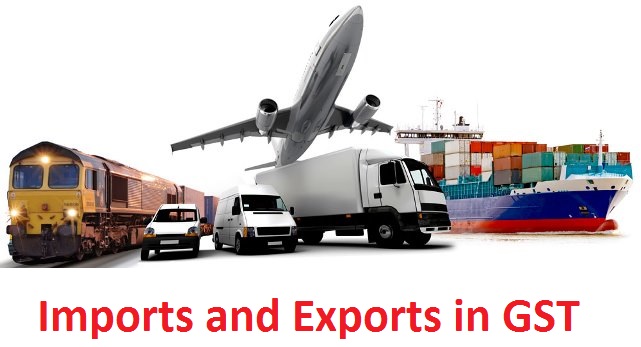
In this topic we will try to cover questions related to Imports and Exports in GST including supplies to SEZ and Input Tax Credit (ITC) available against SEZ supplies.
Q1.Which duties will be levied on the import of goods?
Ans: Customs duty and cess as applicable in past. IGST & GST compensation Ces will be charged additional on imports. IGST and GST compensation cess will be levied after adding all customs duty and customs cess to the value of imports.
Q2. The current procedures have service tax on Nepal but not goods tax. With GST, which tax will apply?
Ans.: The export procedure for Nepal would be same as that to other countries.
Q3. Are there any exemptions for SEZ (Special Economic Zone)? How will an SEZ transaction happen in the GST regime?
Ans: Supplies to SEZs are zero-rated supplies as defined in Section 16 of IGST Act. According to Section 16: “‘ZERO rated supply’ means any of the following supplies of goods or services or both, namely:-
(a) export of goods or services or both; or (b) supply of goods or services or both to a Special Economic Zone developer or a Special Economic Zone unit.
(2) Subject to the provisions of sub-section (5) of section 17 of the Central Goods and Services Tax Act, credit of input tax may be availed for making zero-rated supplies, notwithstanding that such supply may be an exempt supply.
(3) A registered person making zero-rated supply shall be eligible to claim a refund under either of the following options, namely:–
(a) he may supply goods or services or both under bond or Letter of Undertaking, subject to such conditions, safeguards and procedure as may be prescribed, without payment of integrated tax and claim a refund of unutilized input tax credit; or
(b) he may supply goods or services or both, subject to such conditions, safeguards, and procedure as may be prescribed, on payment of integrated tax and claim a refund of such tax paid on goods or services or both supplied, in accordance with the provisions of section 54 of the Central Goods and Services Tax Act or the rules made thereunder.”
Q4. How would the sale and purchase of goods to and from SEZ be treated? Will they be exported or imported?
Ans: Supplies to Special Economic Zones are zero-rated supplies and supplies by SEZs to DTA are treated as imports.
Q5. What’s the status of international export freight under GST? It was exempt under POPS rules. It is zero-rated in most countries.
Ans: POS or ‘place of supply’ for transport of goods determinable in terms of Section 12(8) or Section 13(8) of IGST Act, 2017, depending upon location of service provider/service receiver. Exports are treated as zero-rated supplies.
According to the eighth clause in Section 12 of the IGST Act: “The place of supply of services by way of transportation of goods, including by mail or courier to (a) a registered person, shall be the location of such person; (b) a person other than a registered person, shall be the location at which such goods are handed over for their transportation.”
Also, Section 13(8) reads: “The place of supply of the following services shall be the location of the supplier of services, namely:- (a) services supplied by a banking company, or a financial institution, or a non-banking financial company, to account holders; (b) intermediary services; (c) services consisting of hiring of means of transport, including yachts but excluding aircraft and vessels, up to a period of one month.”
Q6. When goods are being imported from a Special Economic Zone, who will pay IGST?
Ans: Such supply is treated as import and the pre-GST procedure of payment continues with the variation that IGST is levied in place of CVD.
Q7. I have a pending export refund in service tax. What will happen after GST?
Ans: Refunds under earlier laws will be given under the respective laws only.
Q8. As an exporter, how do I ensure that my working capital is not blocked as refunds?
Ans: Appropriate provisions have been made in the law by providing for a grant of 90 percent of the refund on a provisional basis within seven days of the filing of the refund.
Liability on Goods imported from SEZ
When goods are being imported from SEZ who will pay IGST?. The supply is treated as import and the present procedure of payment of duty continues with the variation that IGST is levied in place of CVD.
